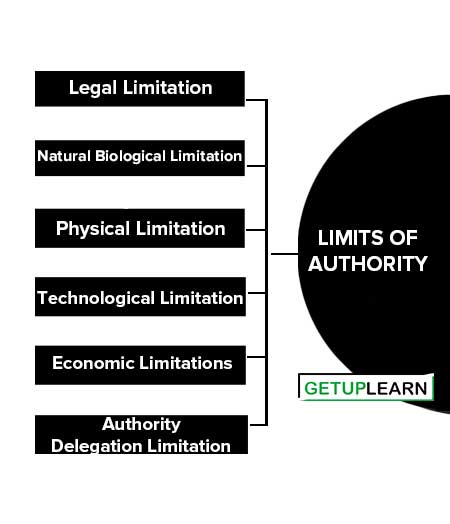The presence or absence of authority cannot be judged merely in terms of the acceptance or rejection of a command. A command may meet with acceptance or rejection in the case of both the presence or the absence of authority.
Therefore, the issue of command alone can hardly be the true indicator of the presence of authority. If the command is obeyed, the existence of authority is not visible. The evidence of authority exists only if it needs to be exercised to correct an incorrect decision.
Table of Contents
The presence of authority is, therefore indicated only if it is coupled with the issue of sanctions for disobedience of the command of the superior.
Over the period of time, many legal, political, ethical, social, biological, technological, physical and even economic limitations have emerged on the authority of a manager in an enterprise. While exercising power, the manager must keep these limitations in mind for the successful utilization of source.
- Legal Limitation
- Natural Biological Limitation
- Physical Limitation
- Technological Limitation
- Economic Limitations
- Authority Delegation Limitation

Legal Limitation
The Articles of Association of a Company may put some restrictions on the board of directors. The bye-laws may place further restrictions on the manager’s authority. The manager’s authority is restricted by the enterprise’s objectives, policies, procedures, programs, etc. Commercial and industrial laws in a country put many restrictions on the authority of a manager.
For example, in India, no employer can take work from his employees for more than eight hours a day. Obviously, every manager, at any level in the organization must respect such restrictions, which affect all managers, alike and one is never free to ignore a procedure, violate a policy, or modify a program. Changes can of course be made but not at the whim of any individual.
Natural Biological Limitation
No subordinate can be ordered to do a job that is impossible to be performed. There are biological constraints, which limit authority just because the human being does not have the capacity to do certain things. For example, one can hardly order a person to walk up the side of a building or do such impossible things.
Physical Limitation
Physical limitations such as climate, geography, chemical elements, and so on put limits on authority. For example, an order to make gold from copper would be ineffectual.
Technological Limitation
There are technological factors also limiting the authority of a manager. For instance, a factory cannot be ordered to be established on the moon, at least not until technology has made this possible. A manager cannot order his peon to type a letter as the latter does not possess the technique of typing. He cannot obey this authority.
Economic Limitations
Sometimes, a manager may not get the work done from the subordinate if the wages paid to him are not commensurate with the efforts and risk involved in the work.
Each manager is subject to specific limitations ordinarily found in his delegation of authority and assignment of duties.
It is possible that a branch manager of a manufacturing unit has the authority to make capital expenditure up to rupees five thousand whereas, for a local warehouse manager, this authority is limited to possible rupees hundred only. Generally, the right to command decreases as it proceeds from the highest to the lower level of an organization structure.
Legal Limitations, Natural Biological Limitations, Physical Limitations, Technological Limitations, Economic Limitations, and Authority Delegation Limitations are the limits of authority.
